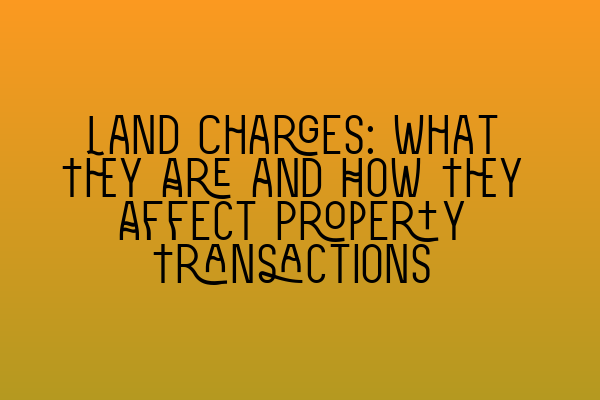Land Charges: What They Are and How They Affect Property Transactions
When it comes to property transactions, there are numerous legal factors to consider. One such factor that often surfaces is the concept of land charges. But what exactly are land charges and how do they impact property transactions? In this blog post, we will unravel the mysteries surrounding land charges and shed light on their significance in property law.
What Are Land Charges?
Land charges are a form of legal charge or encumbrance on property. They are registered against the title of a property, indicating that certain obligations or restrictions exist in relation to that property. These obligations or restrictions can have a significant impact on property transactions, making it essential for buyers, sellers, and solicitors to understand them.
Types of Land Charges
There are several types of land charges that can be registered against a property. Some common examples include:
1. Restrictive Covenants: Restrictive covenants are obligations or limitations on the use of a property. These can include restrictions on building, alterations, or even the type of business that can be conducted on the premises.
2. Notices and Restrictions: Notices and restrictions can be registered to protect interests or rights, such as rights of way, easements, or leases. These serve as warnings to potential buyers about existing arrangements or limitations on the property.
3. Legal Charges: Legal charges usually relate to financial obligations. These can include mortgages, loans, or charges created for unpaid debts.
4. Equitable Charges: Equitable charges arise from equitable interests, which can include interests arising from unpaid purchase money or other forms of debts owed against the property.
How Do Land Charges Affect Property Transactions?
Land charges play a crucial role in property transactions as they can significantly impact the rights and obligations of both buyers and sellers. Here are a few ways in which land charges affect property transactions:
1. Disclosures: When selling a property, it is essential to disclose any land charges that exist against the property to potential buyers. Failure to disclose relevant land charges could lead to disputes or even legal action. Likewise, buyers should carefully review the property’s land charges to ensure they are aware of any encumbrances that may impact their intended use of the property.
2. Financing: Land charges, especially in the form of mortgages, can significantly impact the financing options available to buyers. Lenders will typically conduct thorough checks to assess the risks associated with existing land charges on the property.
3. Planning and Development: Restrictive covenants and other land charges can have implications on planning and development. These charges may limit the type of construction or alterations that can be made to the property, potentially affecting its value or the buyer’s intended use.
4. Due Diligence: Conducting a thorough due diligence process is paramount when considering any property transaction. This includes researching and understanding the land charges registered against the property. A diligent solicitor will review the entries on the Property Charges Register and advise clients accordingly.
Conclusion
Land charges are an integral part of property law and have a significant impact on property transactions. Whether you are buying or selling a property, it is crucial to have a solid understanding of the land charges registered against it. Engaging the services of an experienced solicitor who specializes in property law is essential to navigate the complexities and ensure a smooth transaction.
At SQE Property Law & Land Law, our team of expert solicitors is well-versed in all aspects of property transactions and can guide you through the intricacies of land charges. Contact us today to discuss your property needs and let us handle the legal aspects, so you can focus on your property goals.
